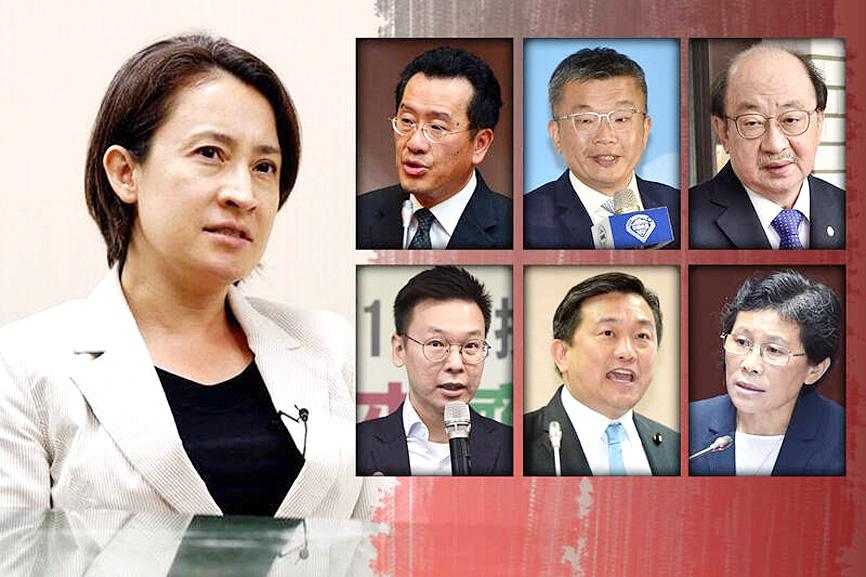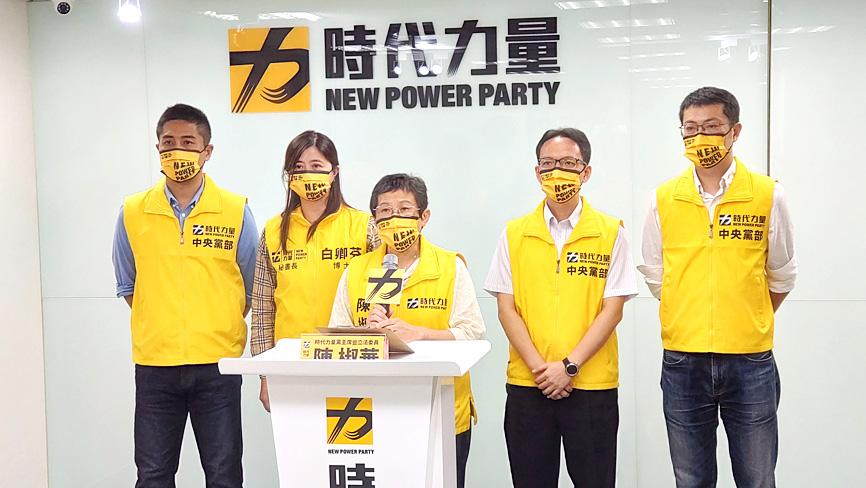The Ministry of Foreign Affairs (MOFA) yesterday slammed China for sanctioning Representative to the US Hsiao Bi-khim (蕭美琴) and six other Taiwanese officials for being “diehard separatists,” saying its attempt to intimidate Taiwanese would backfire.
China has no authority to dictate the actions of Taiwanese, because Taiwan is a democratic nation that upholds the rule of law, and would never yield to intimidation and threats from an authoritarian regime, ministry spokeswoman Joanne Ou (歐江安) told a news conference in Taipei.
China’s state-run Xinhua news agency earlier yesterday reported that the Taiwan Work Office of the Chinese Communist Party Central Committee has imposed sanctions against Hsiao and other “diehard Taiwanese independence separatists.”

Photo compiled by the Taipei Times
In addition to Hsiao, National Security Council Secretary-General Wellington Koo (顧立雄), Deputy Legislative Speaker Tsai Chi-chang (蔡其昌), Democratic Progressive Party (DPP) caucus whip Ker Chien-ming (柯建銘), DPP Deputy Secretary-General Lin Fei-fan (林飛帆), DPP Legislator Wang Ting-yu (王定宇) and New Power Party (NPP) Chairwoman Chen Jiau-hua (陳椒華) were added to the sanctions list, Xinhua reported.
Premier Su Tseng-chang (蘇貞昌), Legislative Speaker You Si-kun (游錫堃) and Minister of Foreign Affairs Joseph Wu (吳釗燮) have been on the list since it was made public in November last year.
The people on the list and their family members are banned from entering China, Hong Kong and Macau, Xinhua reported.

Photo: Yang Cheng-yu, Taipei Times
The sanctions are unlikely to have any practical effect, as senior Taiwanese officials do not visit China.
Their affiliated institutions are restricted from cooperating with organizations and individuals in China, and enterprises related to them cannot engage in business activities in the country, Xinhua said.
The people on the list have gone to great lengths to “collude with external forces” in provocations advocating Taiwanese independence and pose a grave danger to “Chinese national rejuvenation,” Xinhua quoted an office spokesperson as saying.
China’s efforts to deter people from speaking up for Taiwan by targeting politicians and opinion leaders who have worked to enhance Taiwan’s international visibility would only backfire, as it would foster resentment among Taiwanese, Ou said.
The Mainland Affairs Council said the sanctions were “illegal” and “ineffective,” as Taiwan and China do not have jurisdiction over each other.
The government would respond to the sanctions with “necessary measures in a timely manner” to avoid adverse effects, and ensure national security and the public interest, it added.
Lin said on Facebook that he felt “honored” to be sanctioned by an authoritarian regime, adding that he considered it as a “sign of being part of the free world.”
When news of the sanctions came out, many of his friends working in the foreign media, the diplomatic corps and at think tanks sent him congratulatory messages, Lin said.
Chen said that she “felt extremely honored” for being sanctioned, as it shows that Beijing recognizes her determination to defend Taiwan’s sovereignty and democratic values.
“The NPP and I will continue to stand firm on Taiwanese values. Taiwan is an independent, sovereign nation and I am Taiwanese. My determination to defend Taiwan’s democracy and freedom will never change,” she told a news conference in Taipei.
Additional reporting by Shelley Shan

ACTION PLAN: Taiwan would expand procurement from the US and encourage more companies to invest in the US to deepen bilateral cooperation, Lai said The government would not impose reciprocal tariffs in retaliation against US levies, President William Lai (賴清德) said yesterday, as he announced five strategies to address the issue, including pledging to increase Taiwanese companies’ investments in the US. Lai has in the past few days met with administrative and national security officials, as well as representatives from various industries, to explore countermeasures after US President Donald Trump on Wednesday last week announced a 32 percent duty on Taiwanese imports. In a video released yesterday evening, Lai said that Taiwan would not retaliate against the US with higher tariffs and Taiwanese companies’ commitments to

Intelligence agents have recorded 510,000 instances of “controversial information” being spread online by the Chinese Communist Party (CCP) so far this year, the National Security Bureau (NSB) said in a report yesterday, as it warned of artificial intelligence (AI) being employed to generate destabilizing misinformation. The bureau submitted a written report to the Legislative Yuan in preparation for National Security Bureau Director-General Tsai Ming-yen’s (蔡明彥) appearance before the Foreign Affairs and National Defense Committee today. The CCP has been using cognitive warfare to divide Taiwanese society by commenting on controversial issues such as Taiwan Semiconductor Manufacturing Co’s (TSMC, 台積電) investments in the

HELPING HAND: The steering committee of the National Stabilization Fund is expected to hold a meeting to discuss how and when to utilize the fund to help buffer the sell-off The TAIEX plunged 2,065.87 points, or 9.7 percent, to close at 19,232.35 yesterday, the highest single-day percentage loss on record, as investors braced for US President Donald Trump’s tariffs after an extended holiday weekend. Amid the pessimistic atmosphere, 945 listed companies led by large-cap stocks — including Taiwan Semiconductor Manufacturing Co (TSMC, 台積電), Hon Hai Precision Industry Co (鴻海精密) and Largan Precision Co (大立光) — fell by the daily maximum of 10 percent at the close, Taiwan Stock Exchange data showed. The number of listed companies ending limit-down set a new record, the exchange said. The TAIEX plunged by daily maxiumu in just

‘COMPREHENSIVE PLAN’: Lin Chia-lung said that the government was ready to talk about a variety of issues, including investment in and purchases from the US The National Stabilization Fund (NSF) yesterday announced that it would step in to staunch stock market losses for the ninth time in the nation’s history. An NSF board meeting, originally scheduled for Monday next week, was moved to yesterday after stocks plummeted in the wake of US President Donald Trump’s announcement of 32 percent tariffs on Taiwan on Wednesday last week. Board members voted to support the stock market with the NT$500 billion (US$15.15 billion) fund, with injections of funds to begin as soon as today. The NSF in 2000 injected NT$120 billion to stabilize stocks, the most ever. The lowest amount it